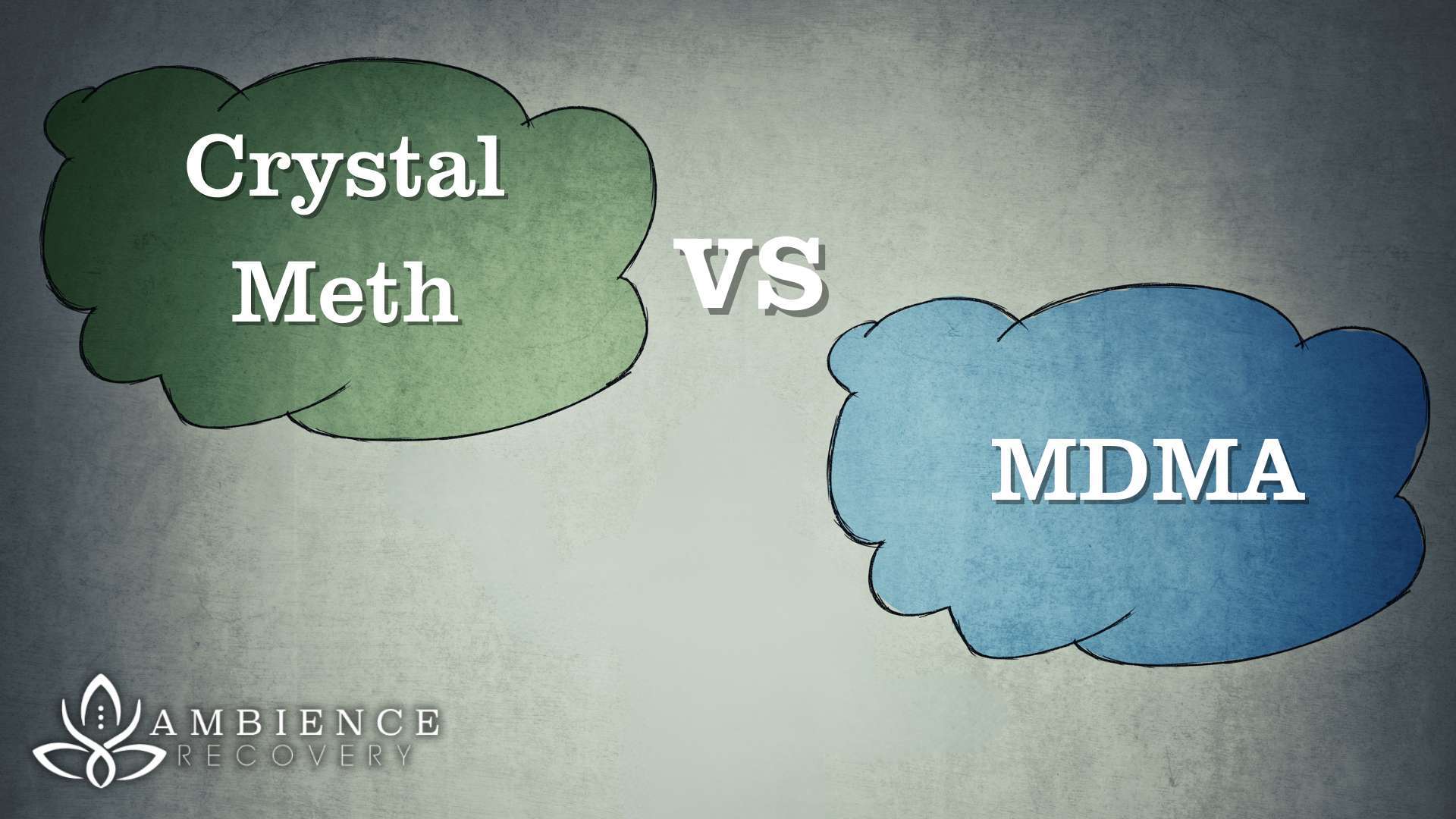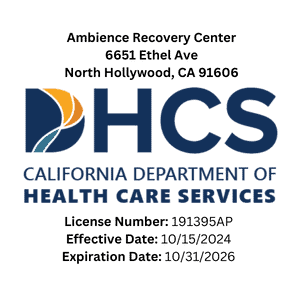Key Takeaways
- MDMA (Ecstasy) and Methamphetamine (Meth) are both stimulants but affect the brain differently.
- MDMA users often experience euphoria and social bonding, while meth users may exhibit aggression and compulsive behavior.
- Both drugs increase dopamine and serotonin, but methamphetamine has stronger, longer-lasting stimulant effects.
- Long-term methamphetamine use leads to severe addiction, cognitive decline, and physical health issues.
- Call 866-721-7470 for professional help with MDMA or meth addiction at Ambience Recovery.
Introduction
MDMA, commonly known as Ecstasy or Molly, and Methamphetamine (Meth) are both stimulant drugs that affect the brain’s neurotransmitters. While these two drugs share some similarities, they have different effects, risks, and long-term consequences.
Many people believe MDMA is a safer alternative to meth, but that is not necessarily true. Both substances can lead to addiction, neurological damage, and serious health complications. Understanding the differences between MDMA and methamphetamine is important for those who may be using or considering using these drugs, as well as for loved ones who want to help someone struggling with addiction.
What is MDMA?
MDMA, short for 3,4-methylenedioxymethamphetamine, is a psychoactive drug that is known for producing euphoria, heightened emotions, and increased social interaction. It is most commonly used in party or club environments, as it enhances sensory experiences and creates a sense of emotional closeness.
When MDMA is consumed, it affects three major neurotransmitters in the brain:
- Dopamine – Creates pleasure and reinforces behaviors.
- Serotonin – Boosts mood, increases emotional bonding, and regulates sleep.
- Norepinephrine – Increases heart rate and blood pressure.
The effects of MDMA typically last between 3 to 6 hours, but the comedown period can bring fatigue, depression, and mood swings. Over time, repeated MDMA use can cause long-term serotonin depletion, which may result in memory problems, emotional instability, and difficulty experiencing pleasure.
What is Methamphetamine?
Methamphetamine, often referred to as Meth or Crystal Meth, is a powerful stimulant that produces intense energy, alertness, and euphoria. Unlike MDMA, methamphetamine is typically used in longer sessions and at higher doses, leading to severe addiction and harmful long-term effects.
Meth primarily affects dopamine levels in the brain, but unlike MDMA, it does not significantly increase serotonin. This leads to a more intense and longer-lasting high that can last between 8 to 24 hours.
Chronic methamphetamine use can cause:
- Severe addiction and compulsive drug-seeking behavior.
- Aggression, paranoia, and hallucinations.
- Physical deterioration, including weight loss, skin sores, and dental decay (“meth mouth”).
While MDMA is often viewed as a recreational drug, methamphetamine is more frequently associated with compulsive use, criminal activity, and devastating physical health effects.
Key Differences Between MDMA and Methamphetamine
| Feature | MDMA (Ecstasy) | Methamphetamine (Meth) |
| Classification | Psychoactive stimulant & empathogen | Powerful stimulant |
| Primary Effects | Euphoria, increased social interaction, sensory enhancement | Intense energy, euphoria, increased focus |
| How It Affects the Brain | Increases dopamine, serotonin, and norepinephrine | Stronger dopamine release, minimal serotonin impact |
| Duration of Effects | 3-6 hours | 8-24 hours |
| Addiction Risk | Moderate | High |
| Common Side Effects | Jaw clenching, dehydration, emotional crash | Insomnia, paranoia, violent behavior |
| Long-Term Effects | Serotonin depletion, memory issues, mood swings | Cognitive decline, severe addiction, psychosis |
Although both drugs stimulate dopamine release, methamphetamine’s effects last much longer and cause more long-term damage to the brain.
Effects and Risks of MDMA Use
MDMA is often thought of as a party drug, but it comes with serious risks. While some users experience enhanced mood, empathy, and a sense of connection, others may suffer from severe dehydration, overheating, and serotonin depletion.
Some of the dangers of MDMA use include:
- Increased heart rate and body temperature, which can lead to heatstroke or organ failure.
- Depression and anxiety following use due to serotonin depletion.
- Neurotoxicity, where repeated use damages brain cells, leading to memory problems and emotional instability.
MDMA is sometimes mixed with other substances like cocaine, amphetamines, or opioids, which increases the risk of overdose and unpredictable side effects.
Effects and Risks of Methamphetamine Use
Methamphetamine use is associated with severe health and behavioral consequences. Unlike MDMA, which is primarily taken for social and sensory enhancement, methamphetamine is often used in a binge pattern, leading to longer drug sessions and intense withdrawal symptoms.
Some of the long-term dangers of methamphetamine use include:
- Severe malnutrition and weight loss.
- “Meth mouth” – extreme dental decay caused by dry mouth and poor hygiene.
- Hallucinations, paranoia, and violent outbursts.
- Significant brain damage, leading to impaired memory and judgment.
Methamphetamine use also significantly increases the risk of overdose, particularly when mixed with other stimulants or opioids.
Addiction and Withdrawal: MDMA vs. Meth
Both MDMA and methamphetamine can lead to dependence and withdrawal symptoms, but methamphetamine withdrawal tends to be more intense and long-lasting.
MDMA Withdrawal Symptoms:
- Fatigue and low energy.
- Depression and mood swings.
- Sleep disturbances and difficulty concentrating.
Methamphetamine Withdrawal Symptoms:
- Intense drug cravings.
- Severe depression and anxiety.
- Paranoia and suicidal thoughts.
While MDMA withdrawal is mostly psychological, methamphetamine withdrawal is both physical and mental, making it much harder to quit without professional treatment.
Treatment for MDMA and Meth Addiction
Both MDMA and methamphetamine addiction require professional treatment for successful recovery. At Ambience Recovery, we offer:
- Medical Detox to help manage withdrawal symptoms safely.
- Individual and Group Therapy to address the emotional and behavioral aspects of addiction.
- Cognitive Behavioral Therapy (CBT) to develop healthier coping strategies.
- Aftercare Planning & Support Groups to prevent relapse and maintain long-term sobriety.
If you or a loved one is struggling with methamphetamine or MDMA addiction, seeking professional treatment can help break the cycle of drug use and provide the support needed for lasting recovery.
Conclusion: Get Help for MDMA or Meth Addiction
While MDMA and methamphetamine may seem similar, meth is significantly more addictive and harmful. Both drugs increase dopamine and serotonin, but meth’s long-term effects can be devastating.
If you or a loved one is struggling with stimulant addiction, don’t wait until it’s too late. Call 866-721-7470 today to speak with a recovery specialist at Ambience Recovery. Help is available, and recovery is possible.
FAQs
How is MDMA different from methamphetamine?
MDMA primarily affects serotonin and dopamine, creating euphoric and prosocial effects. Methamphetamine causes stronger dopamine spikes, leading to long-lasting energy, aggression, and addiction.
Is MDMA addictive?
While MDMA is less addictive than meth, frequent use can lead to psychological dependence, withdrawal symptoms, and long-term brain changes.
Why is meth more dangerous than MDMA?
Methamphetamine has a stronger stimulant effect, lasts longer, and is highly addictive, leading to severe physical and mental health problems.
Where can I get help for MDMA or meth addiction?
Ambience Recovery offers detox, therapy, and rehab services for stimulant addiction. Call 866-721-7470 to start your recovery journey today.
Resources
https://www.dea.gov/factsheets/ecstasy-or-mdma-also-known-molly
https://nida.nih.gov/research-topics/mdma-ecstasy-molly
https://medlineplus.gov/methamphetamine.html
Katie is a Licensed Clinical Social Worker who has worked as a primary therapist, supervisor, and now clinical director for SUD/MH treatment centers for the past 12 years. Katie is trained in Brainspotting, EMDR, Internal Family Systems and Dialectical Behavior Therapy and is passionate about treating substance use disorders, trauma and grief.






